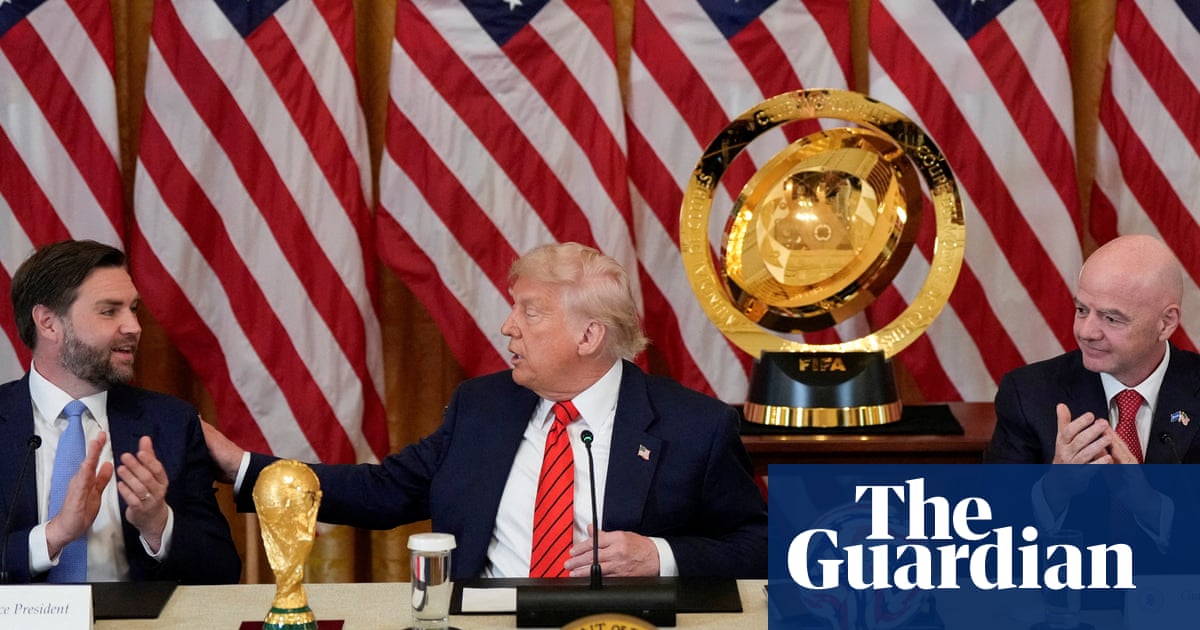US presidentDonald Trumpconvened the first meeting of his administration’s 2026 World Cup task force on Tuesday in a public event in which he revealed that he did not know Russia had been banned from Fifa competitions and insisted the tournament would go off without a hitch.
Boasting repeatedly that the 2026World Cup, due to be co-hosted by the United States, Canada and Mexico, will be the “biggest, safest and most extraordinary soccer tournament in history”, Trump went on to claim that the tournament would generate “tens of billions of dollars in economic activities for local businesses” and “thousands and thousands of jobs for American workers”.
Fifa presidentGianni Infantino, sitting next to Trump in front of the trophy for this year’s Club World Cup, later put specific numbers to those benefits: $50bn in economic output and almost 300,000 jobs as a result of this year’s tournament and next year’s showpiece occasion.
Numerous doubts have been raised over the last year about the United States’ ability to smoothly host the 2026 tournament. In particular, the government must process a very large number of visas for the foreign visitors expected to visit the United States in time for the competition, with wait time for some extending for a year or longer.
In February, areport from a non-profitrepresenting the travel industry said “We’re not ready to host the upcoming mega decade of events that will draw millions of domestic and international travelers,” citing wait times for visas along with crumbling transit infrastructure and an outdated security appratus. These concerns have increased since the Trump administration’s mass downsizing of the US government.
In Tuesday’s meeting, Homeland Security secretary Kristi Noem said 2m foreign visitors were expected to come to the United States for the tournament. Asked about the concerns at Tuesday’s task force meeting, Noem said that her department would work with the Department of State and the FBI to handle visitors’ travel documents and that “it will go smoothly.” Noem appeared at the task force gathering alongside former US Soccer Federation president Carlos Cordeiro, now a senior advisor to Infantino, who she said would also be partly responsible for getting documents processed in a timely manner.
“America will welcome the world,” Infantino said. “Everyone who wants to come here to enjoy, to have fun to celebrate the game, will be able to do that.”
However, numerous quips were made about the potential of visitors overstaying their welcome – notable given the administration’s recent crackdown on immigrants and green card holders, which has included unlawfully deporting some to a megaprison in El Salvador.
“We want them to come, we want them to celebrate, we want them to watch the game,” said vice-president resident JD Vance. “But when the time is up, they’ll have to go home. Otherwise they’ll have to talk to Secretary Noem.”
The World Cup could also present problems for fans looking to move around within host cities, as most within the United States lack well-developed public transportation options. Transportation secretary Sean Duffy said that most inter-city transportation issues would be solved with busses, and that no long-lasting transit projects would remain as a result of hosting the tournament.
“This is a short-term push of people coming in to see soccer matches, and then they’ll go home,” said Duffy, who encouraged visitors to use the World Cup as an opportunity to take a road trip around the US. “But don’t overstay your visa,” he said.
Trump denied that recent tensions with Mexico and Canada would have any impact on the countries’ ability to co-host the tournament and said the matter was discussed with newly-elected Canadian prime minister Mark Carney during his visit to the White House earlier in the day.
Later, Trump was asked for his thoughts on Russia’s ban from Fifa competitions as a result of their invasion of Ukraine in 2022. Trump said he was not aware Russia was banned, turning to Infantino and asking if that was true.
“They are banned from playing for the time being, yeah,” Infantino said. “We hope that something happens, that peace will happen and then Russia will be re-admitted.”
